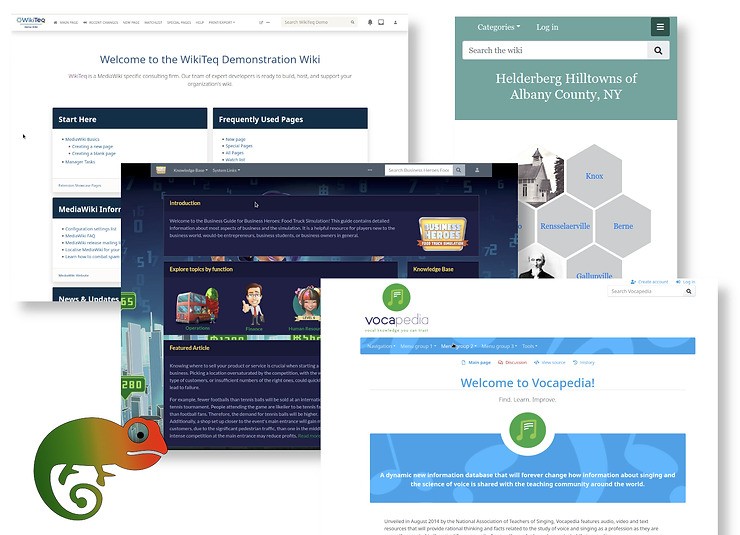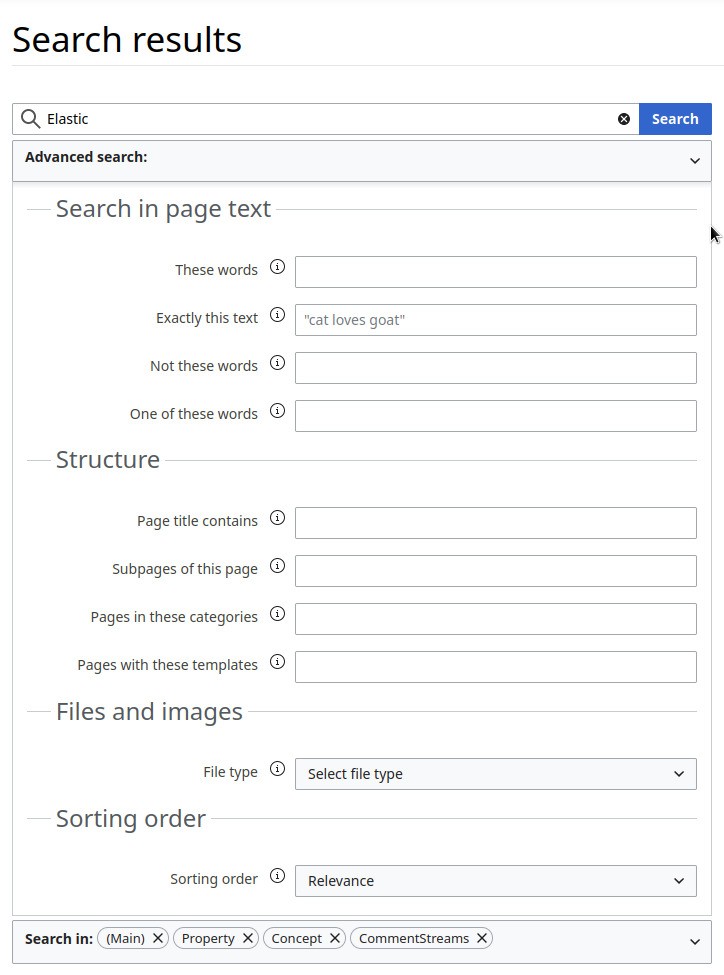Using MediaWiki for Business
Talking about use cases for MediaWiki in a business environment and busting the most common myths about MediaWiki.
Talking about use cases for MediaWiki in a business environment and busting the most common myths about MediaWiki.

Built to serve millions of clicks a day, MediaWiki is an extremely scalable and feature-rich wiki implementation. For most people, it is synonymous with Wikipedia, the publicly editable global encyclopedia. The habit of mistakenly thinking of MediaWiki as a collection of encyclopedia articles can make us forget the engine behind it.
Meanwhile, MediaWiki's ability to process and display data stored in a database opens up a wide range of options for its use in a corporate environment, primarily as a knowledge management system.
Modern information explosion will increase at an exponential rate. No single person or department can update and maintain the vast sea of corporate information. While organizations need their knowledge to be consistent, authoritative, up-to-date, secure, accessible to processes and people directly and in a timely manner, in real life often no one has time to document things.
The company's unique approach to work is its competitive advantage. Knowing how to do right things in this market and during this time period is critical to business success.
Knowledge scattered across thousands of email messages remains inaccessible and will be lost when changing personnel. If not shared in the corporate space, knowledge creation efforts will be repetitive, duplicated, and wasted.
The world is changing, and business processes must adapt to the new reality, as well as documentation. Version and history control becomes critical. Changes must be distributed quickly and at low cost.
The question is what system can provide the ability of a business to:
As part of a global project, MediaWiki is open source and free. It matures in a process of continuous improvements made by hundreds of developers. The underlying technologies - SQL, PHP, CSS, Javascript - are ready for production and are widely adopted industry standards.
Employees are typically too busy or reluctant to learn the new system, but in MediaWiki they do basically the same things they are used to, browsing the Internet, filling out web forms, liking, and commenting.
MediaWiki is extremely adaptable and extensible for specific data management and user experience requirements, offering the biggest in the wiki world collection of extensions, gadgets and skins.
You will no longer need to attach a multi-megabyte file to the letter, leaving the management of several local copies of the document to your recipients. Instead you will share a link to the document, which will always be available in the current version and in the same location. Being wiki pages, your documents or articles have the full history of changes, can be linked to other documents, have attachments, embedded images, video, and interactive elements.
MediaWiki’s ability to retrieve, store, process and display external data, along with a system of templates and a brilliant transclusion feature allows to reuse data stored onboard or in external systems.
MediaWiki can be integrated with AD, LDAP or other authentication and authorization services. A single deployment of MediaWiki can power a number of databases, handling shared and wiki specific resources (Wiki Farm).
The most obvious use cases for MediaWiki in a business environment are:
As we mentioned above, the MediaWiki is free, standard compliant, it can be hosted within the corporate network, and system maintenance costs are virtually none, except for initial adaptation to the needs of a particular business or organization, and ongoing improvements.
MediaWiki has changed significantly in the last few years. WikiTeq also works hard to match expectations of its corporate clients and eliminate stereotypes that can lead to a wrong decision about the best knowledge management system for your business.
Although MediaWiki markup is still the most powerful and versatile tool, knowledge of wiki markup is no longer required. The VisualEditor is advanced enough to provide a frictionless WYSIWYG workflow similar to an office word processor. Forms, templates, and styles allow users to design documents beautifully with minimal effort. It allows a smooth learning curve and creates a very good adoption.
Getting VisualEditor work is no longer a trouble. It has been completely rewritten and now works out of the box with no extra dependencies. With each release of MediaWiki, VisualEditor covers more and more formatting and page management features. We have a blog on using VisualEditor you can read here.
The ability to work with data is added through the use of extensions such as Semantic MediaWiki, Cargo, External Data, Data Transfer, Wikibase, etc. They allow you to plan taxonomies to describe business-specific data objects. Data fragments can be embedded directly into the text or passed to a template responsible for processing the data and formatting the output. You can even batch create unified pages based on data in a CSV file or other structured format. You can read an article comparing Wikibase, SMW, and Cargo here.
Docker container is a quick and easy way to get a preconfigured environment optimized for running MediaWiki. The docker image from WikiTeq automates most aspects of the configuration, allowing you to install any of the ~150 extensions and skins by simply mentioning them in the docker configuration file. Even an advanced setup with Varnish cache or Elasticsearch can be done in minutes by any system administrator.
The part of MediaWiki responsible for its overall design is a skin. There are dozens of skins that may convert MediaWiki into a branded knowledge management tool, with clean data- or document-centric interface. WikiTeq docker image offers several skins to choose from, and if you are not happy with any of them, choose the Chameleon skin: it is based on Twitter Bootstrap, supports all screen sizes and offers tools and components for easy customization, matching corporate style and data specifics.

Mediawiki uses fulltext search natively, offering options to search separately by namespaces. It is precise and correct but can lead to huge sets of results, most of which – although contain the search pattern - would be irrelevant to the desired document (eg. you look for a form and get a bunch of news, etc.). It can be improved by introducing an advanced search engine (Elasticsearch) that supports masks, fuzzy search, complex search patterns, results highlighting, search in the page code and in the rendered text, etc.

In addition to the fulltext search, MediaWiki with data management extensions installed allows parameterized search by data properties and values, providing 100% relevant results and in a variety of formats (calendars, tagclouds, datatables, maps, graphs, etc.).
In this blog, we have not made comparisons between MediaWiki and its closest competitors. We've tried to convey our love and passion for this great software and give readers a new perspective on MediaWiki. We have many other blogs on various MediaWiki topics you can read here.
Do not hesitate to schedule a free, no obligation call with us to discuss your business needs and see if MediaWiki is the right fit for you.
Here’s what we've been up to recently.

Discover the inner workings of Large Language Models (LLMs) in our comprehensive blog that delves into the complexities of these advanced AI algorithms. Learn how LLMs, powered by deep learning and transformer models, analyze extensive datasets to master the intricacies of human language, and how MediaWiki can be used as a training environment.
From us to your inbox weekly.
We use cookies to provide and improve our services. By using our site, you consent to cookies.
Learn more